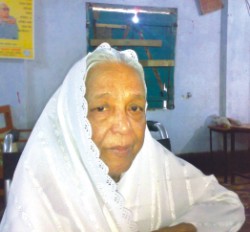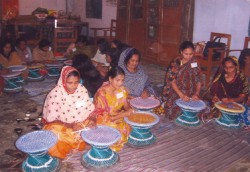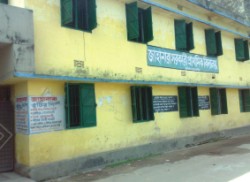|
Interview
Dignity Through Labour
Tithi Farhana
 |
| Jahanara Begum |
Bangladesh has been blessed with many pioneers and visionaries who have dedicated their lives, skills and experiences to enhance women's status in society by providing them with financial independence. Jahanara Begum is such a visionary who decided to reach out to the most vulnerable and distressed women of society. By engaging them in cottage industry training and providing jobs for them she has helped many poor women find a means to earn a livelihood. Local people of Comilla call her the 'queen of cottage industry'. In 1962 she was awarded by the then governor Azam Khan with the “Kutir Shilper Kandari.”Queen Elizabeth, had heard about Jahanara Begum's achievements and when she came for a visit to Dhaka to see an exhibition of arts and handicrafts at Dhaka Stadium she was impressed by Jahanara's innovative products and presented her with a gold medal and cash prize.
How and when did you start your journey?
At age seven, I first started production of handicrafts with my friends as a means to earn money to pay for my school fees. This gradually turned into an industry. I started at my hometown Shuvopur, with a measly 3 taka investment. In the beginning, I and my friends used to make dula, chakni , chaluni and moshto out of bamboo. My first groups of customers were fish wholesalers who used to do business on the banks, of the Gomoti River. During such time, it just so happened that a close relative of mine had received a small piece of property to be used as a class room. I had envisaged paying the salary of the teacher who would work there and thought of raising the money through collecting small donations and through selling handicraft products. By this time, the concept of Kutir Shilpo (handicrafts) had taken root in my mind as a full fledged profession.
 How did you expand your activities? How did you expand your activities?
After my marriage, I settled in Adda village of Baruda Thana. With support of my husband Moninul Islam Miyagi and father- in law late Azmat Ali, I came to Comilla and settled on the northern part of lake Nanua. Women who used to live on the side of Tamukia neighbourhood began to come to my house. And soon I had a list of trainers comprising wives of daily labourers and rickshaw pullers. The founder of Bard Comilla was so impressed with my work that he did not stop at simply appreciating my efforts.He even created a small rent-free sales outlet for me in front of Bard.
How socially conscious were the women you trained at that time?
It was unbelievable. I got their support and assistance. Many poor and abandoned women were coming and taking part in the activities. I had been uniting such women in a collective group by engaging them in kutir shilpo training followed by the creation of employment opportuties. In 1972, I took the initiative to establish Bojrarur cooperative society. My aim had always been to ensure financial security of women with my leadership another 86 women's societies were established.
What is your vision and what are your goals?
 I emphasize on self-reliance. I preach and practice the theme “dignity through labour” in its integrated approach at the production and training level. With this vision in mind, it has set the following mission and objectives: I emphasize on self-reliance. I preach and practice the theme “dignity through labour” in its integrated approach at the production and training level. With this vision in mind, it has set the following mission and objectives:
* Provide employment and income to socially deprived indigenous artisans.
* Combine other social activities along with production of handicraft.
* Pay legtimate wages to the artisans.
* Promote locally produced handicrafts in the market both within the country and the outside.
* Produce good quality products to promote the talents of our craftsmanship.
* Design new consumer products and train the artisans to make them.
What is the present status of Jahanara Cottage and Industries?
In 2004-2005 fiscal year, 300 women from different districts of Bangladesh have gained training under the Cooperative Department. In 2007 180 members of cooperative society have taken training on block-printing, batik and dress designing. In 2007-2008 fiscal year, more than 180 people have taken training. Tribal people from Rangamati , Bandarban , Netrokona , Mymensingh and Sylhet have also taken training . Eighty cooperative members have taken training on handicraft and cottage industry under the Comprehensive Village Development Programme(CVPD) of BARD.
Are your children engaged in your business?
Yes . I have 3 sons and 4 daughters. My second son Md. Abdul Ahsan who is ADC and has achieved PHD in Micro Finance. My other children are directly or indirectly involved with my business .My youngest son , Kayrul Basher Shipon is director of this organisation and is looking and coordinating every project and programme.
Are you exporting your products?
Handicraft products are beings exported directly to various member organisation of IFAT( International Federation Of Alternative Trade ) in USA (Ten Thousand Villages , SEERV International) , Canada (Ten Thousand Villagers ) , UK ( Tradecraft Plc) , Sweden ( North And South Exchange AB) And Japan ( The Fair Trade Company ).
How have you been recognised for your achievement’s.
 I work for social development and women empowerment , nevertheless I have achieved many awards, including The Comilla Foundation Gold Medal, in 1977 for contribution to the creation of employment opportunities and for overall development of women ,cash prizes for creation of cooperative constitution and for playing the role of a leader in 1985, the National Social Welfare Award in 1988 , The Independence Day Medal in 1993 for her special contribution to rural development , The Rotary Club Award and 10 other top awards in 2000 , The Award On Occasion Of The Thirtieth Anniversary Of Women For Women for my life - long contribution to the important of lives of other women , The Best Zilla Cooperative title under the district of Chittagon. I have also won 18 gold medals . Recently , I have won Shada Moner Manush. I work for social development and women empowerment , nevertheless I have achieved many awards, including The Comilla Foundation Gold Medal, in 1977 for contribution to the creation of employment opportunities and for overall development of women ,cash prizes for creation of cooperative constitution and for playing the role of a leader in 1985, the National Social Welfare Award in 1988 , The Independence Day Medal in 1993 for her special contribution to rural development , The Rotary Club Award and 10 other top awards in 2000 , The Award On Occasion Of The Thirtieth Anniversary Of Women For Women for my life - long contribution to the important of lives of other women , The Best Zilla Cooperative title under the district of Chittagon. I have also won 18 gold medals . Recently , I have won Shada Moner Manush.
What is your opinion about the future of cottage industries of Bangladesh?
Cottage industry is a traditional epitome of Bangladeshi art and culture. It also symbolizes the heritage of rural Bangladesh. I have transformed this tradition into a way for employment, rural development and economic emancipation for under privileged women. I think government, NGO and private sectors should come forward and take a positive approach in development of cottage industry. As a result, I am all for cooperative revolutions in rural development and advocate collective cooperation that can change the nation and unquestionably advance the condition of women and poor people.
Jahanara Begum has written quite few book on cottage industry and its development and history. These are:
“Comilla Shilpo Bishok Pustak” (1976),Jahan Ara's Kutir Shilpo Rushiar ( In English 1980) , Embroidery Design Pustak” (1984, Dorji Biddya Shikka ( 1986), Kutir Shilper Jari Ghan (1988), Utpadito Pather Shochitro Catalog ,” 1990) , Kutir Shilpo (1988) And Bashtobayone Adda Grame Kutir Shipler Oboshon (1976).
Copyright
(R) thedailystar.net 2009 |
